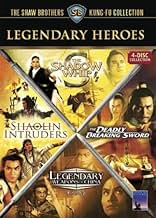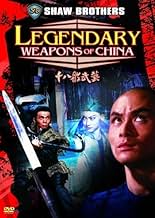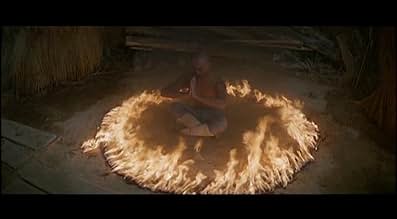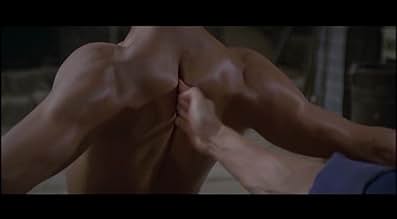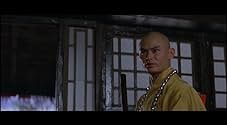VALUTAZIONE IMDb
6,8/10
1969
LA TUA VALUTAZIONE
Aggiungi una trama nella tua linguaA band of killers from an ailing kung fu and magic society are sent on a manhunt for a former member of the society, whose bad mouthing threatens its existence.A band of killers from an ailing kung fu and magic society are sent on a manhunt for a former member of the society, whose bad mouthing threatens its existence.A band of killers from an ailing kung fu and magic society are sent on a manhunt for a former member of the society, whose bad mouthing threatens its existence.
- Regia
- Sceneggiatura
- Star
- Premi
- 1 candidatura in totale
Liu Chia-Yung
- Lei Ying
- (as Chia-Yung Liu)
Kara Ying Hung Wai
- Fang Shao-Ching
- (as Kara Hui)
Recensioni in evidenza
10bickeler
Anyone who has reviewed this movie and stated the plot is stupid has no knowledge of 19th century China. In fact during the Boxer Rebellion these "Boxers" believed through rituals they could make themselves impervious to firearms. No I am not making this up and neither did Chia-Liang Liu and while he exaggerated and had fun with it for comedic values he was making an historical notation. The Martial Arts in this movie are exceptional and so is the outrageous humor instilled in this movie. Not only did he poke fun at the Boxers but also many of the Martial Arts movies of the 1970s that went a little overboard with the magical Kung Fu element. And all in the same breath showed the usage of almost every weapon used in Chinese Martial Arts. The talent in this movie speaks for itself aside from Liu and his brothers there is Fu Sheng, Hou Hsiao and the sweet Kara Hui. They don't make Martial Arts movies this original or good anymore either with all the Ip Man clones and CGI epics not even close. All I can say is Chia-Liang Liu you are sorely missed.... And the point is no amount of skill will help you dodge a bullet!
This is a great kung fu movie once you get the opening done with. The storyline is fairly confusing in the beginning, but that passes with time. The fight scenes are neat to watch, but they get exponentially better as time goes on. The fight with Gordon Liu (36th Chamber) is good and the final fight WAS FANTASTIC! This isn't a movie to sit down and watch for the stimulation. The character development isn't as good as FIVE VENOMS, or SWORDSMAN II, but it's fair. The weapons fighting is just unbelievable in the last fight scene. All in all, if you are a fan of kung-fu movies, get around to checking this one out. The three-section-staff work is even better than in 36th Chamber.
'Legendary Weapons Of China (1982)' is a little bit confusing at first, with a variety of gang factions all searching for a supposed traitor without actually knowing what he looks like. Because we also don't know who he is, it can be a bit difficult to discern who's who and who's lying about who they really are. It doesn't help that the true intentions of the various searchers aren't made clear until later on in the picture. After a while, though, everything sort of coalesces when the flick gives us some much-needed exposition as to what it's actually about. From then on, it's much easier to follow. Besides, the story itself isn't the main reason that anyone's watching this. That would be the immense fight sequences, of course, and none of them disappoint. The flick puts a lot of focus on three types of supernatural martial arts: magic, spiritual boxing and Maoshan. The first allows the user to conjure up a variety of secret weapons, teleport in balls of smoke and create decoys of themselves at a moment's notice; at its highest levels, it can be used to command others to do one's bidding. The second allows the user to withstand blows from bladed weaponry without so much as a scratch. The third makes use of voodoo-esque techniques to control other people, binding them to dolls which can be manipulated with twisting motions and pressure point manipulations. It's these three techniques that really marks the picture as something distinct from a lot of its peers, and it allows for some distinct choreography that constantly keeps the audience as on their toes as those involved in the battles themselves. Furthermore, the flick makes use of some confined spaces that necessitate further invention in terms of designing the bouts that take place within them. It's really fun to see people fighting in a cramped attic or tight alleyway, making use of their environment to avoid attacks both physical and otherworldly. It's a nice change from the genre's tendency to have its bouts take place in wide open arenas. Having said that, there are plenty of action scenes that take place in said spaces. They aren't any worse off for this, even if they are more traditional, mostly because their choreography is consistently phenomenal and their formal execution is consistently accomplished. That's what you'd expect from director Chia-Liang Liu, of course, but he cements his position as one of the greatest action directors of all time with each new film of his I see. Plus, he gets to really shine in front of the camera this time. Although he has cameos in a lot of his films, he's arguably the protagonist of this one and a lot of the set-pieces are focused almost entirely on him. The final duel is jaw-droppingly good, an intense one-on-one that makes use of 13 of the 18 eponymous legendary weapons (5 are used in an earlier sequence) and is reinvigorated each time the characters adopt a new fighting tool. It's fast-paced, exciting and unbelievably impressive. The same can be said of another stand-out set-piece, a hand-to-hand bout that features Gordon Liu in a rare villainous role and features some choreography I've never seen before (Liu makes use of his shoulder blades to fight facing backwards!). The third notable conflict occurs just after a hugely entertaining sequence of a charlatan conspiring with his gang to convince an entire town he's a famous Kung fu fighter, which sees the same conman unwittingly take on an opponent while he's under the influence of Maoshan folk magic. It's a genuinely funny scene that makes excellent use of slapstick comedy in combination with impressive athleticism, with Alexander Fu Sheng being tossed around like a ragdoll so convincingly you forget it's actually him doing all the flipping. The humour is present in a number of other scenes, too, which keeps things feeling suitably lighthearted even when people are fighting for their lives. Ultimately, although the plot is a little confusing to start with (and takes a while to properly get going), movie is a ton of fun when it's fully underway. The experience is a bit uneven, but - more often than not - it fires on all cylinders and its Kung fu is absolutely spectacular. It's a blast.
I think watching Shaw Brothers movies is a bit like doing martial arts; if you go a while without practice, you lose the progress and skills you built up. I went on a binge of the studio's movies early last year, then went away for a bit, and now I'm back, feeling out of shape and out of breath trying to keep up with Legendary Weapons of China.
It could be partly or wholly on me, but I'm also open to the idea that this one might just be a bit much. It throws many characters and concepts (voodoo, invulnerable warriors, mistaken identities, disguises, magic, etc) at you so quickly; I was confused from the start and just got more confused as I went on.
Now, a confusing plot hasn't got in the way of me really enjoying martial arts movies before, but I was also confused during various fight scenes in Legendary Weapons of China. It's hard to get a handle on how some of the fantasy elements work, and who has the power to do what, and with the usual fast pacing and feeling that everything is slightly sped up (not just in the fight scenes either, unusually; I think that added to the confusion for me), I couldn't keep up.
Now, if that's on me (and I'm sure at least some of it is), I can't call this terrible. There is at least the ability to admire its ambition and unique qualities, even if those things did make me lose track of the things I'd usually enjoy. And the final fight scene did redeem things in my eyes a little. It downplays the crazy magic stuff to mostly just be a one-on-one fight that goes on for a while and involves many different weapons, and it was easily the most impressive sequence from a stunt/choreography perspective.
This is the kind of film where anyone who can keep up is likely to have a blast, but for whatever reason, tonight, it was just a little too much too fast for me personally. Gotta get back to my Shaw Brothers training regime, maybe...
It could be partly or wholly on me, but I'm also open to the idea that this one might just be a bit much. It throws many characters and concepts (voodoo, invulnerable warriors, mistaken identities, disguises, magic, etc) at you so quickly; I was confused from the start and just got more confused as I went on.
Now, a confusing plot hasn't got in the way of me really enjoying martial arts movies before, but I was also confused during various fight scenes in Legendary Weapons of China. It's hard to get a handle on how some of the fantasy elements work, and who has the power to do what, and with the usual fast pacing and feeling that everything is slightly sped up (not just in the fight scenes either, unusually; I think that added to the confusion for me), I couldn't keep up.
Now, if that's on me (and I'm sure at least some of it is), I can't call this terrible. There is at least the ability to admire its ambition and unique qualities, even if those things did make me lose track of the things I'd usually enjoy. And the final fight scene did redeem things in my eyes a little. It downplays the crazy magic stuff to mostly just be a one-on-one fight that goes on for a while and involves many different weapons, and it was easily the most impressive sequence from a stunt/choreography perspective.
This is the kind of film where anyone who can keep up is likely to have a blast, but for whatever reason, tonight, it was just a little too much too fast for me personally. Gotta get back to my Shaw Brothers training regime, maybe...
10winner55
This is a brilliantly constructed film. I suppose those who remark it having a 'poor plot' long for something more simple, more direct, more traditionally 'Shaw Bros.' To be sure, the plot is intended to provide support for the interlaced themes, but it is complex and meaty on its own terms.
However the themes are indeed the heart of the film. The comic scene of the fake kung fu battle is clearly intended as a parody of the traditional swordplay film, down to the hand-squeezed blood-squib. The use of magic kung fu is, less clearly because more subtly, intended to debunk the myth of such magic, reducing it to a kind of martial-arts parlor trick - magnificently staged, but of course ineffective against anything other than itself. The real martial arts are at last presented with considerable credibility in the final third of the film, but is intended to remind us that, as powerful as it could be, the martial arts cannot compete with modern weaponry. Along the way, we also deal with problems of family loyalty, national loyalty (vs. phony 'patriotism'), and the nature of the spirituality necessary to master the martial arts, which requires an open mind and compassion rather than blind dedication.
What director Liu is reaching for is nothing less than a complete debunking of all the nonsense that had wrapped itself around the study of the martial arts in the 19th century and which was resurrected in the wake of the kung fu film phenomenon of the 1970s. Liu is asking us to respect, even admire, the martial arts, perhaps to learn them - but on their own terms, without all the myths that obscure their real essence.
This makes for a highly sophisticated script, which Liu carefully keeps popularized not only through the use of humor but, more importantly, by tight compression of story and editing. Blink and you will surely miss an important event.
As for the staging and camera-work some have remarked - technically, this film is pure classic Shaw Bros.
And as for the martial arts in the final battle - absolutely magnificent.
Unique in its genre and a real treat.
However the themes are indeed the heart of the film. The comic scene of the fake kung fu battle is clearly intended as a parody of the traditional swordplay film, down to the hand-squeezed blood-squib. The use of magic kung fu is, less clearly because more subtly, intended to debunk the myth of such magic, reducing it to a kind of martial-arts parlor trick - magnificently staged, but of course ineffective against anything other than itself. The real martial arts are at last presented with considerable credibility in the final third of the film, but is intended to remind us that, as powerful as it could be, the martial arts cannot compete with modern weaponry. Along the way, we also deal with problems of family loyalty, national loyalty (vs. phony 'patriotism'), and the nature of the spirituality necessary to master the martial arts, which requires an open mind and compassion rather than blind dedication.
What director Liu is reaching for is nothing less than a complete debunking of all the nonsense that had wrapped itself around the study of the martial arts in the 19th century and which was resurrected in the wake of the kung fu film phenomenon of the 1970s. Liu is asking us to respect, even admire, the martial arts, perhaps to learn them - but on their own terms, without all the myths that obscure their real essence.
This makes for a highly sophisticated script, which Liu carefully keeps popularized not only through the use of humor but, more importantly, by tight compression of story and editing. Blink and you will surely miss an important event.
As for the staging and camera-work some have remarked - technically, this film is pure classic Shaw Bros.
And as for the martial arts in the final battle - absolutely magnificent.
Unique in its genre and a real treat.
Lo sapevi?
- QuizChia-Liang Liu: [martial arts demonstration] Opening credits show a demonstration of martial arts against an empty backdrop.
- Versioni alternativeThe 1987 UK video suffered extensive cuts of over 5 minutes and lost all footage of Japanese throwing stars and nunchaku used in the fight scenes.
- ConnessioniFeatured in Compagnie pericolose (2001)
I più visti
Accedi per valutare e creare un elenco di titoli salvati per ottenere consigli personalizzati
- How long is Legendary Weapons of China?Powered by Alexa
Dettagli
- Tempo di esecuzione1 ora 49 minuti
- Mix di suoni
- Proporzioni
- 2.35 : 1
Contribuisci a questa pagina
Suggerisci una modifica o aggiungi i contenuti mancanti

Divario superiore
By what name was Legendary Weapons of China (1982) officially released in India in English?
Rispondi


